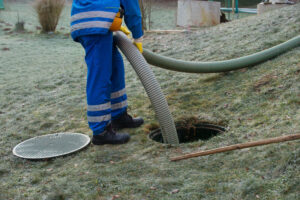 In the Carolinas, the temperature can dip below freezing sometimes in the winter. Though most winter days are in the 40s, 50s or 60s, there can be some in the 30s or even 20s. If you live on a property in the Carolinas with a septic system buried underground, should you “winterize” it? What does that even entail?
In the Carolinas, the temperature can dip below freezing sometimes in the winter. Though most winter days are in the 40s, 50s or 60s, there can be some in the 30s or even 20s. If you live on a property in the Carolinas with a septic system buried underground, should you “winterize” it? What does that even entail?
When to Shut Down Your System
If you have a property that you don’t actually use year-round, such as a country cabin or beach house, you might want to shut down the septic system for the winter in order to prolong its life and keep it operating well in the years to come. You’d shut down a septic system in order to help prevent a frozen system, which is what you don’t want!
Be Weary of Shortcuts
Now you might be tempted to pour certain things down your drains, like automotive antifreeze or salts, to “winterize” the septic system, but don’t do that. Also, if you leave your water on during the winter, ensure there aren’t any drips or leaks as a constant, low flow of water could actually cause your system to freeze. If you don’t plan to “be there” for a long time, it’s time to drain! Drain your water supply lines. Shut off the water where it enters the structure. Drain all faucets and leave them open. Drain your pressure tank, too. Drain your pumps. Drain hoses, too. Then disconnect the electrical supply from your associated components such as the pump, water heater, washer, etc. Drain the water heater. Disconnect all hoses and flush your lines.
Septic Tank Winterizing Services in North Carolina
There’s a lot that goes into winterizing your house, its drains, pipes and septic system. You can call Carolina Septic Pro at 980-500-1022 to come pump the septic tank. You don’t want your sewage to get cold and freeze. Starting with an empty tank in the Spring, then, means starting with warm effluent that’s desirable in your soil treatment area.
Avoid cutting the grass over the soil treatment area as soon as mid-September each year. You want your grass to be a little longer than average there since it will help insulate the system/tank below. This helps prevent freezing. You could also spread straw or leaves over the soil treatment area to insulate it. Also, avoid parking vehicles, walking on or depositing snow banks on the soil treatment area.
